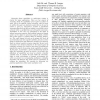Free Online Productivity Tools
i2Speak
i2Symbol
i2OCR
iTex2Img
iWeb2Print
iWeb2Shot
i2Type
iPdf2Split
iPdf2Merge
i2Bopomofo
i2Arabic
i2Style
i2Image
i2PDF
iLatex2Rtf
Sci2ools
139
click to vote
ICAI
2003
2003
A Quantitative Model of Capabilities in Multi-Agent Systems
Reasoning about capabilities in multi-agent systems is crucial for many applications. There are two aspects of reasoning about the capabilities of an agent to achieve its goals. One is the symbolic, logical reasoning, which is based on whether the agent can determine a plan that can be used to achieve a goal (i.e. “know-how”). Another is quantitative reasoning about levels of skill and whether a set of tasks can be achieved within a specified time and with quality constraints. Capabilities in this sense are determined by the limits of internal processing capacity. Both artificial agents and human agents can be subject to processing capacity limits, whether due to CPU speed, or cognitive limits on attention, memory, etc. This could depend not only on the unique skill levels of each individual and their cognitive abilities, but also on their ability to handle those task demands in parallel, given intrinsic limits on internal cognitive resource capacities. In past work, researchers h...
Related Content
| Added | 31 Oct 2010 |
| Updated | 31 Oct 2010 |
| Type | Conference |
| Year | 2003 |
| Where | ICAI |
| Authors | Linli He, Thomas R. Ioerger |
Comments (0)

